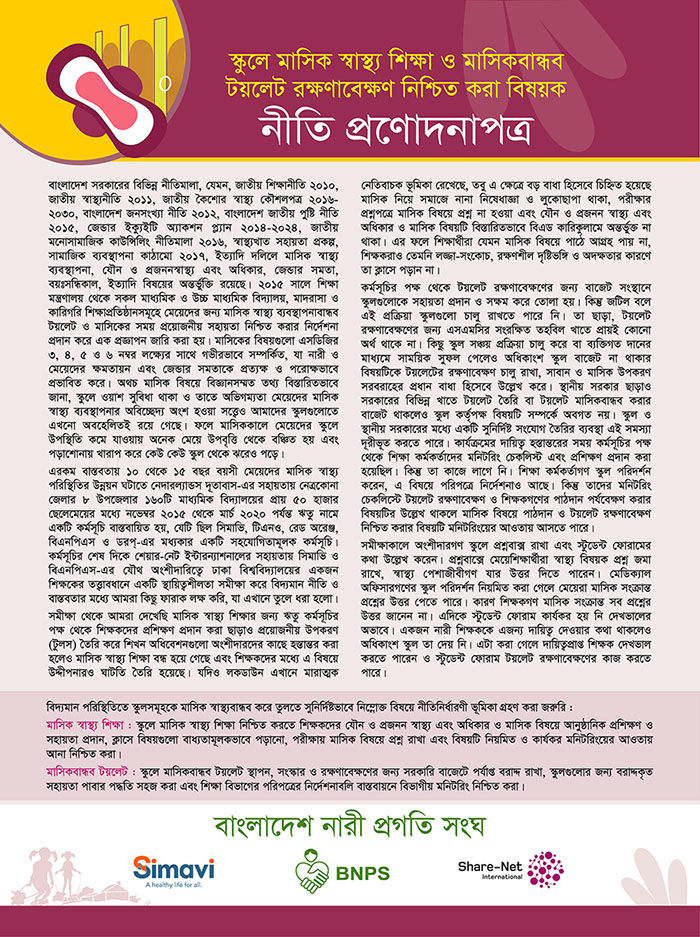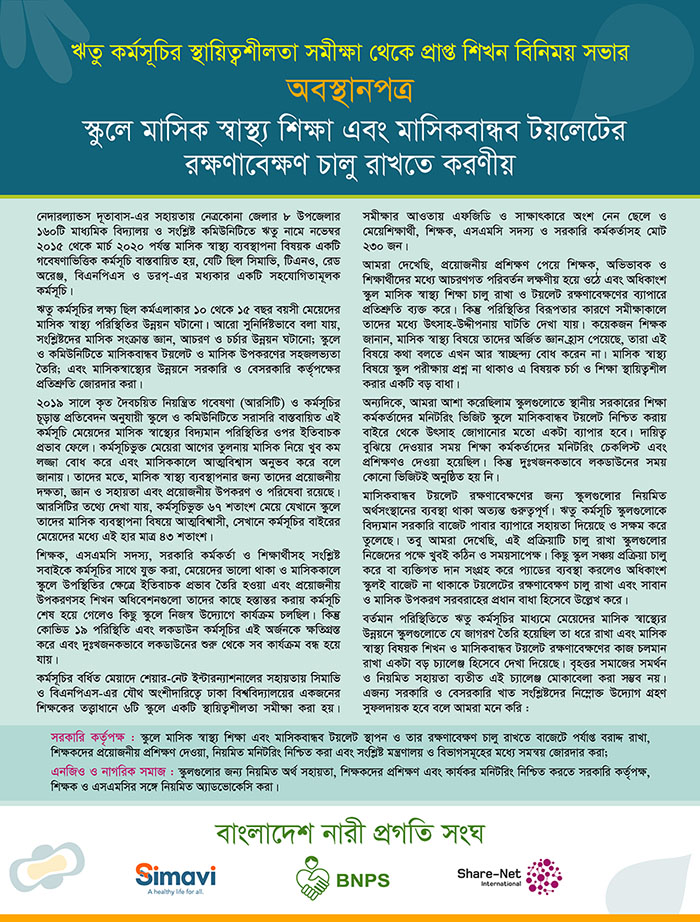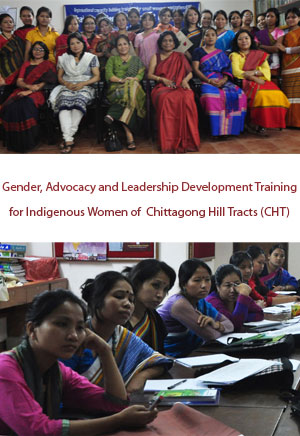| |
 |
BNPS organized a Learning Sharing Event through Zoom platform on RITU Sustainability Study on 15 April 2021. The agenda of the event was to discuss on how to sustain the achievements of Ritu programme, implemented during November 2015 to March 2020.
The Ritu programme aimed to improve the menstrual health of girls between 10 and 15 years old in Bangladesh. The programme combined a set of direct interventions in schools and communities in Netrakona district, with national level advocacy and (social) media campaigns. Reaching a total of 25,844 girls, the direct interventions had a positive impact on their menstrual health. Girls reported to feel less ashamed and more confident during their menstruation and to have the skills, knowledge, support, and necessary products and service to perform menstrual practices (Ritu RCT, 2019, Ritu Final Report, 2020).
The event was anchored by Ms. Shahnaz Sumi, Deputy Director, BNPS and Chaired by Ms. Rokeya Kabir, Executive Director, BNPS. Ms. Mahbuba Haque Kumkum, Progamme Manager, Simavi presented the findings of the study. The speakers were Mr. Mohammad Zobair Hasan, Director - Research, Planning and Monitoring, DORP; Mr. Iqbal Hossain, Education Specialist, UNICEF; Mr. Mahfuj-ur Rahman, MHM Platform; Mr. Alok Kumar Majumder, Country Coordinator, WAI, Simavi; Mr. Syed Mahfuz Ali, Senior Specialist, NCTB; Prof. Momtaz Shahanara, Vice-Principal, Govt. TTC; Mr. Moniruzzaman, National Consultant, PSB, LGED Department and Ms. Mushfiqua Zaman Satiar, Senior Policy Adviser, SRHR and Gender, EKN. Besides, there was a question and answer session where Ms. Sharothi Rani Shaha, Executive Director, SEED, Rangpur and Farhana J Hassan, TdH participated. In total 38 individuals attended in the 2 hours long event.
The speakers in the event drew important recommendations over the study findings. Some of those are as follows:
- It is also important to evaluate the project by the Union Parishad members, SMC members, and the stakeholders from schools and upazila level. To capture their voices on how it has worked well and commitments for scaling up the good practices.
- Anchoring the project components with relevant government department is necessary that would be fruitful for advocacy initiatives.
- Good practices of the Ritu project should accommodate with the local government departments for scaling up and replication.
- Why even the control schools also have positive changes that needs to explore.
- A resource bank can be developed where all of the study papers are archived and accessible for all to use for further advocacy initiatives.
- A brief of the study paper should develop and disseminate among the relevant departments and organizations.
- The evidences of the project should include in the national strategy paper with the help of the MHM platform members.
- Disposable system should be included during scaling up.
- Advocacy is necessary to monitor and finance with the help of Local Government Departments.
- The learning of budget tracking process for schools should be included in future project implementations.
- The MHM issue should be incorporated in the B.Ed. training (teachers training) curriculum.
BNPS developed, printed and disseminated two knowledge products (Position Paper and Policy Brief) on the sustainability study during the event. Based on the findings the Policy Brief covers following two messages for advocacy:
Menstrual health education: To ensure menstrual health education at schools it is necessary to provide formal training to the teacher on SRHR and MH, make the MHM lessons a must for classroom teaching, include MHM related question in school exam, and ensure regular and effective monitoring by the education officials.
Girls’ friendly toilet: It is necessary to set up girls’ friendly toilet at schools, allocation of fund for toilet maintenance in the government budget, simplify the process for the schools to get access to the fund and monitoring implementation of the circulars of education department at the field level.
On the other hand the Position Paper highlighted two key areas below to consider during new project development in future:

Public sector: The government should allocate budget for MHM education, to construct girl’s friendly toilet at schools, to cover cost of maintenance, teachers training on MHM teaching and strengthen coordination between the ministries and departments to ensure regular and effective monitoring.
NGO and CSOs: Should involve with advocacy and lobby with the government authorities, teachers and SMCs to ensure regular allocation of fund for toilet maintenance, teachers training and effective monitoring of MHM teaching, learning activities at schools.
The Ritu programme was a collaboration between Simavi, TNO, RedOrange, BNPS and DORP, funded by Simavi and the sustainability study was a collaboration between Simavi, Dhaka University and BNPS, funded by Share-Net International.

|








